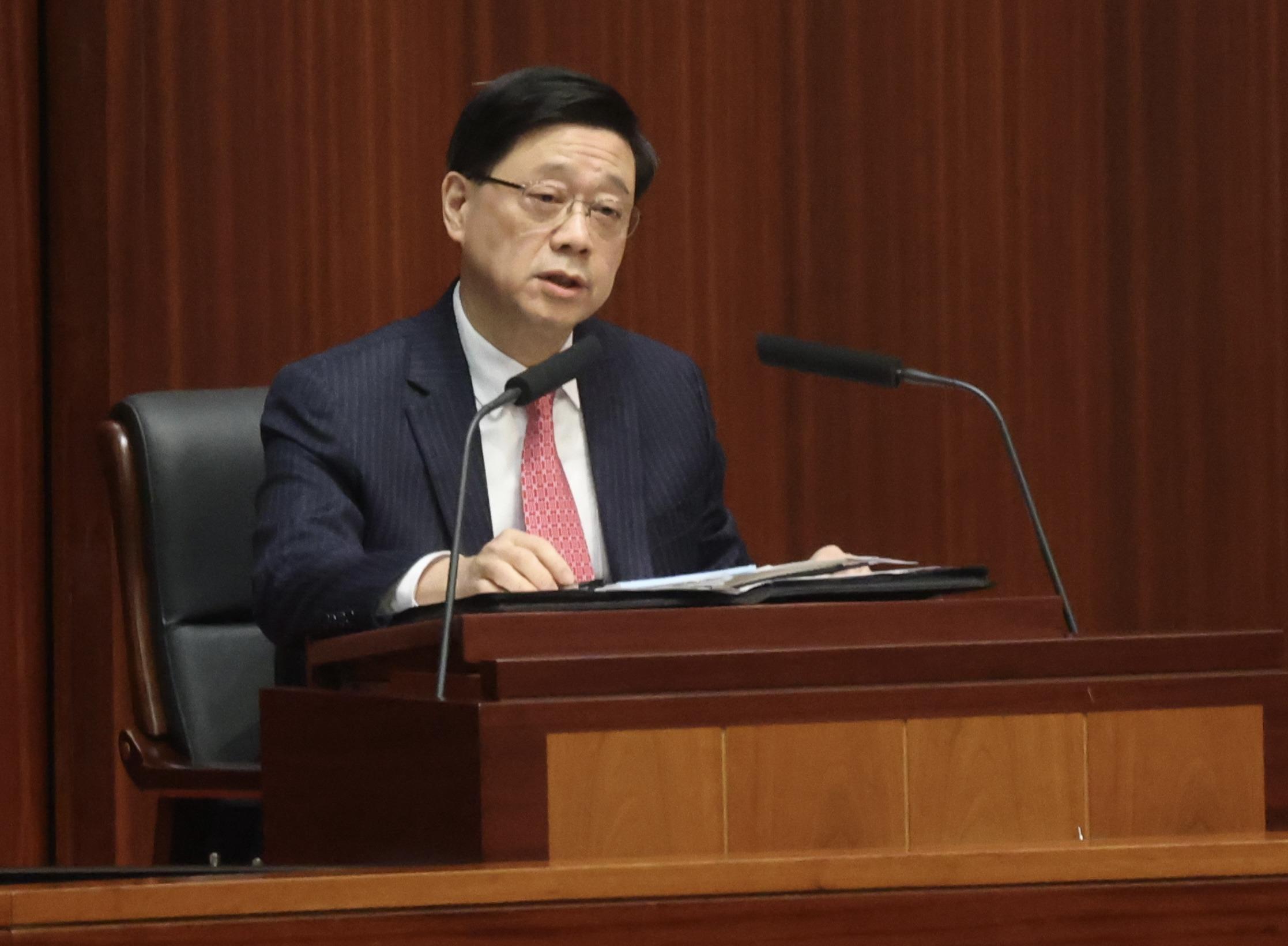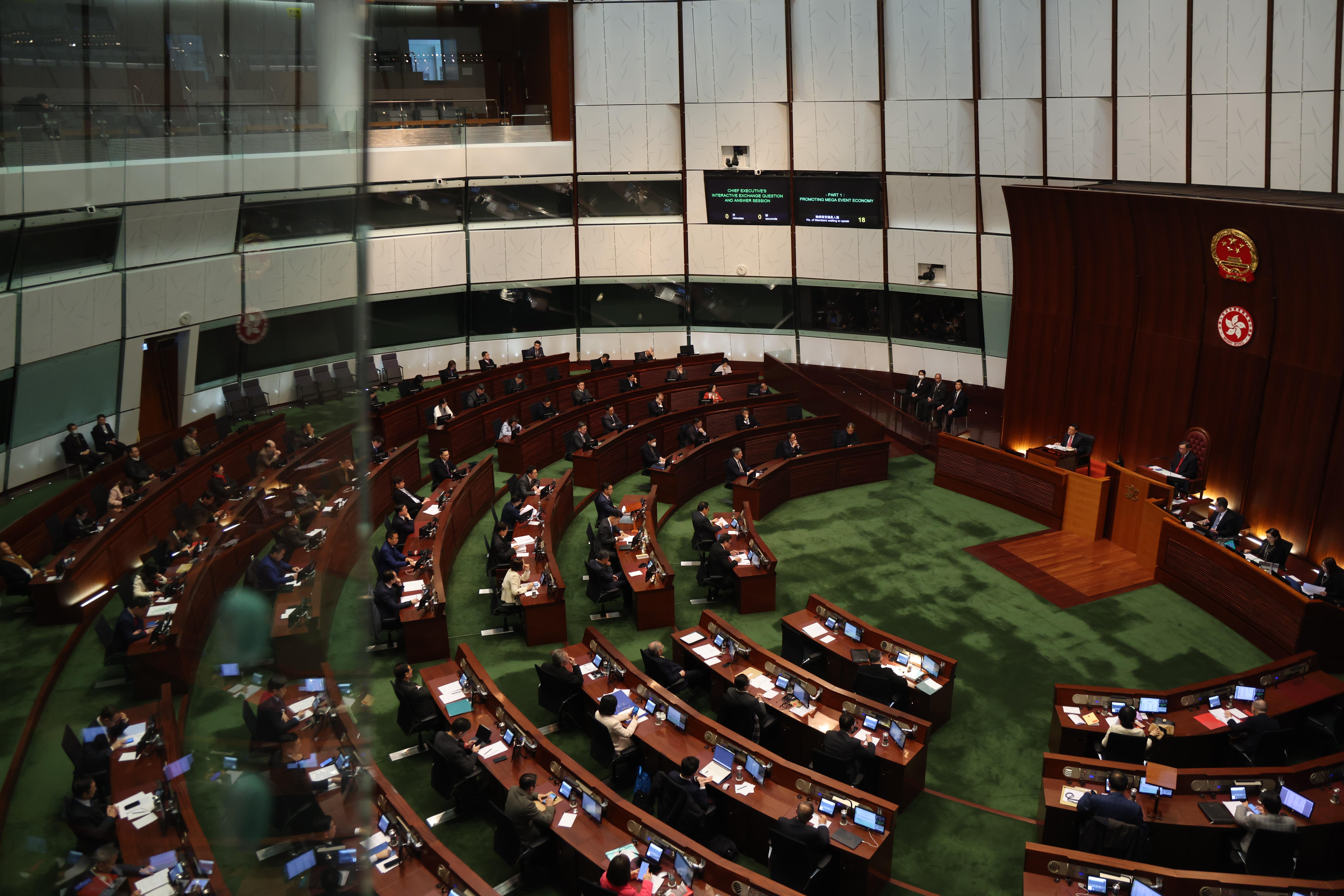 Hong Kong Chief Executive John Lee Ka-chiu speaks during the Chief Executive's Interactive Exchange Question and Answer Session, at the Hong Kong Legislative Council Complex, in Central, Hong Kong, Jan 25, 2024. (EDMOND TANG / CHINA DAILY)
Hong Kong Chief Executive John Lee Ka-chiu speaks during the Chief Executive's Interactive Exchange Question and Answer Session, at the Hong Kong Legislative Council Complex, in Central, Hong Kong, Jan 25, 2024. (EDMOND TANG / CHINA DAILY)
Hong Kong Chief Executive John Lee Ka-chiu vowed there would be an all-out effort to explain the need for the local legislation of Article 23 of the Basic Law, which will be put before the city’s legislature this year, saying it will put an end to issues that have troubled the city for years.
The city can concentrate on boosting the economy, seeking development opportunities, and solving livelihood issues without distraction, Lee told a roomful of lawmakers during a questions and answers session on Thursday, which was focused on how the city can host large-scale events to boost the economy and on the local legislation for Article 23 of the Basic Law.
ALSO READ: Hong Kong going flat out to legislate on Article 23
Article 23 of the Basic Law stipulates that the Hong Kong Special Administrative Region shall enact laws on its own to prohibit seven types of national-security endangering acts — namely treason, secession, sedition, subversion against the central government, theft of State secrets, acts by foreign political organizations or bodies to conduct political activities in the region, and acts by local political organizations or bodies to establish ties with foreign political organizations or bodies.
Lee emphasized the government's unwavering commitment to fulfilling this duty and highlighted the societal consensus that has emerged following the 2019 unrest over the need to effectively address national security concerns
Lee expressed confidence that the city, through the concerted efforts of patriots, will fulfill its constitutional duty, which has been delayed for 26 years.
Lee revealed plans for a systematic approach to explain the legislation from the top down, with the government establishing multiple dedicated teams, including a core team and support teams, to facilitate this process.
READ MORE: Cheung: HK remains on track to enact Article 23 by end of 2024
Lee, along with Secretary for Security Chris Tang Ping-keung and Secretary for Justice Paul Lam Ting-kwok, will serve as key spokespersons. Additionally, other policy bureaus will be actively involved in promoting and clarifying the legislation, while Chief Secretary for Administration Eric Chan Kwok-ki and Financial Secretary Paul Chan Mo-po will assist in the coordination.
The government will also brief the business sector, the media and foreign consulates about the draft legislation. The city’s district councils and care teams in 18 districts will also do their part in explaining the legislation to the community.
Lawmakers, scholars and legal experts can also play a part in this, Lee said.
ALSO READ: HK judiciary ‘will not yield’ to threats in national security cases
Lee emphasized the government's unwavering commitment to fulfilling this duty and highlighted the societal consensus that has emerged following the 2019 unrest over the need to effectively address national security concerns.
 The Chief Executive's Interactive Exchange Question and Answer Session is held on Jan 25, 2024, at the Hong Kong Legislative Council Complex, in Central, Hong Kong. (EDMOND TANG / CHINA DAILY)
The Chief Executive's Interactive Exchange Question and Answer Session is held on Jan 25, 2024, at the Hong Kong Legislative Council Complex, in Central, Hong Kong. (EDMOND TANG / CHINA DAILY)
Lee also revealed that the government will set up a contingency response team to deal with any possible attacks on the legislation, considering the ill-intentioned attacks mounted online and on social media by anti-government forces in the recent past.
After the 2019 social unrest, Hong Kong residents became aware that there are many malevolent actors and threatening countries that seek to harm the city, Lee said. Hong Kong must therefore take measures to resist hostile attacks and prevent espionage activities in the city in a bid to safeguard its own interests and economic development, he added.
READ MORE: Upcoming geopolitical risks justify Article 23 legislation
He noted that Hong Kong has been repeatedly smeared despite having relatively lenient national security-related laws compared with those of foreign countries and regions.
During the questions and answers session, lawmaker Koon Ho-ming expressed his concern over the government's explanation efforts to date, while lawmaker William Wong Kam-fai inquired about the inclusion of artificial intelligence and data security measures in the national security legislation. He raised the possibility that individuals could exploit big data and artificial intelligence technologies to jeopardize national security.
Lee said the technological landscape is developing rapidly, and there is a need to be forward-thinking in the legislation of Article 23. He highlighted the importance of being able to address the challenges posed by technological advancements without compromising the legal framework.
READ MORE: Lai stands trial on charges of endangering national security
The aim is to ensure that the legislation remains robust and adaptable, regardless of potential future abuses involving big data or the emergence of new technologies, he added. Relevant government departments are currently conducting research into addressing these concerns effectively.


